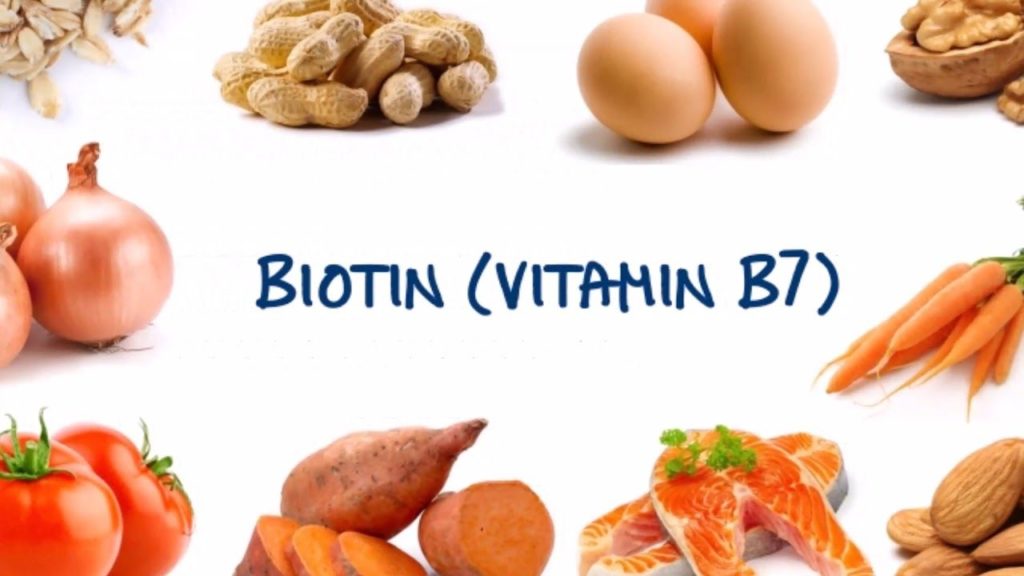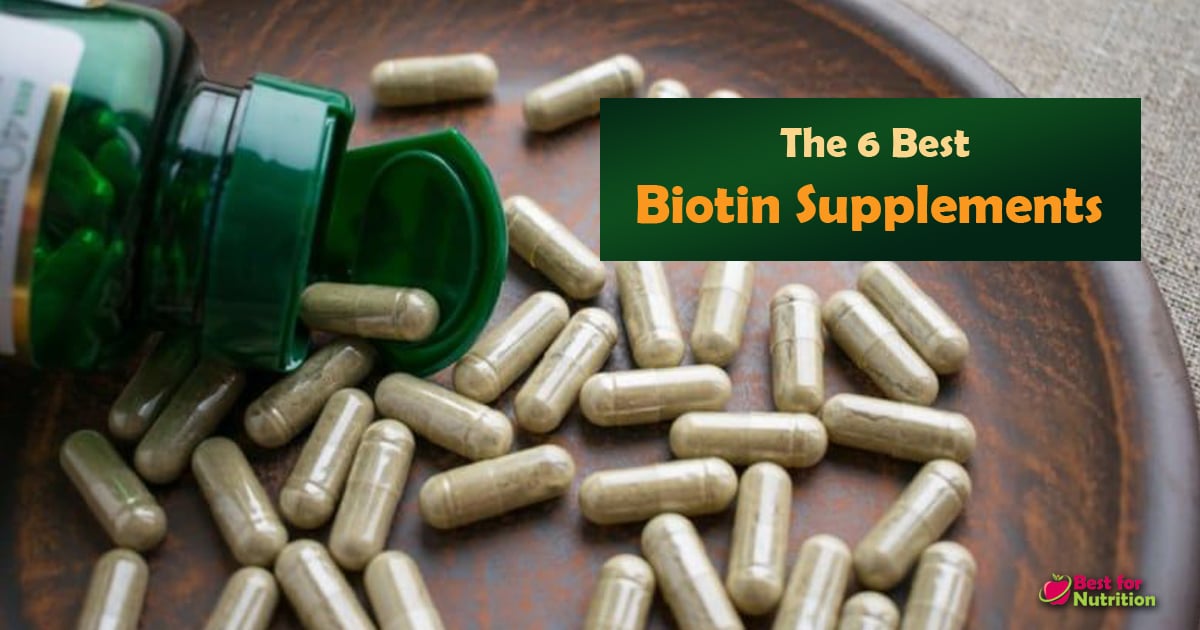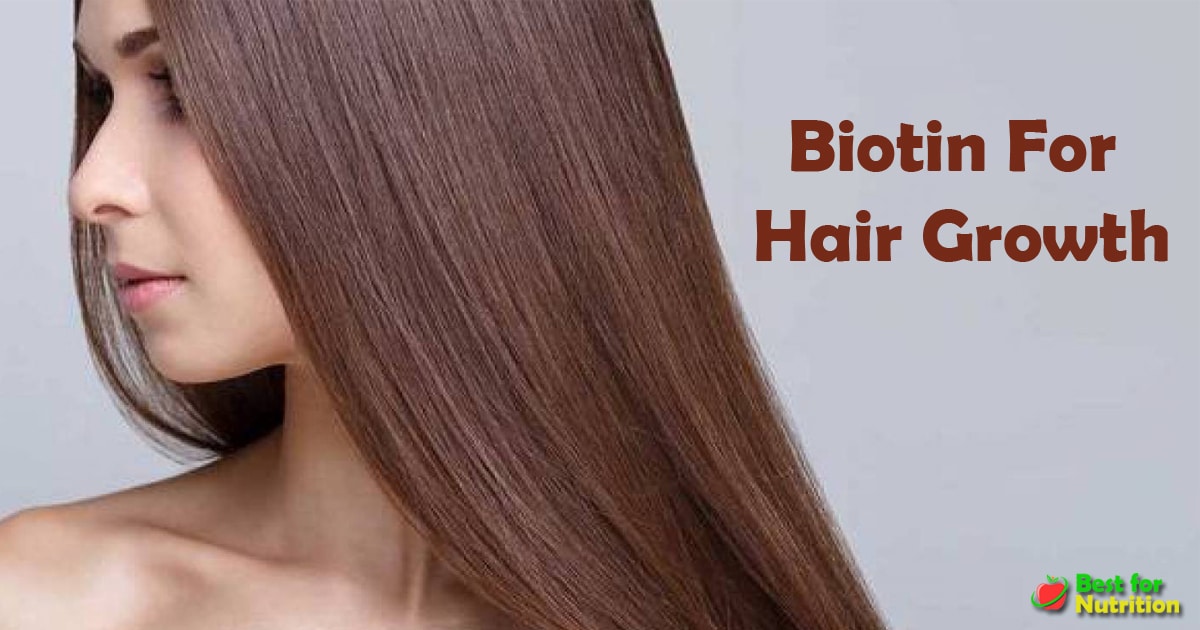Biotin originates from the Greek word “biotos,” which means life. It has recently gained popularity as an effective solution against hair problems. It is also said to keep the skin and nails healthy. Let us take a closer look at biotin and examine the evidence that shows its benefits.
Biotin is a vitamin that belongs to the vitamin B family. It is often known as B7, or Vitamin H. Its primary function in the human body is to break down nutrients like proteins, carbohydrates and provide energy to the body. Biotin is required in small quantities to meet the daily nutritional requirement.
Being a water-soluble vitamin, the removal of excess biotin in the body is a very easy process. Thus, it is rare to find any notable side effects due to excess consumption, but the deficiency of biotin may affect the quality of hair, skin, and nails. In addition to including biotin-rich foods in the daily diet, you can also explore the several biotin supplements that are easily available in the market.
What is Biotin?

We know that biotin is a water-soluble vitamin that is needed to obtain energy from the nutrients we consume. But how does biotin help in maintaining hair and skin health?
Biotin helps in improving the keratin levels in the body. Keratin is an essential protein that forms hair and skin, and biotin enhances the production of this protein, which leads to its positive effects on overall hair and skin health.
The daily biotin requirement can easily be met by consuming foods rich in biotin. Some natural sources of biotin are egg yolk, nuts like almonds, walnuts, soybean, legumes, bananas, cauliflower, etc.
One thing that needs to be kept in mind is that the effect of biotin lessens upon exposure to heat. It is advised to either consume the foods raw or cook with minimal use of heat in order to get the maximum benefits from biotin-rich foods.
Though biotin is also produced by beneficial gut bacteria in our bodies, biotin supplements are a great way to ensure you get adequate quantities of this vital nutrient. These supplements are particularly helpful to those who are allergic to foods rich in biotin or in places where their availability is scarce.
Care should be taken that supplements should only be consumed as per the recommended dosages mentioned on the package or as prescribed by the health consultant.
10 Research-Backed Health Benefits of Biotin
Studies and research have shown that the benefits of biotin go far beyond healthy hair and skin. Here are some of the prominent ones:
Biotin Promotes Hair Growth
Biotin is being hailed as a solution for all the problems related to hair growth. A study was conducted in 2015 on women experiencing hair thinning problems. The participants were either given oral protein tablets containing biotin or a placebo for 90 days twice a day. It was noted that the women who were put on oral protein supplement showed significant improvement in their hair growth and also reported less hair fall (1).
Other studies have concluded that the consumption of biotin does give a positive result and improves overall hair growth (2). However, more comprehensive studies are needed to understand the benefit of biotin on hair growth.
Summary: Consuming biotin-rich foods or supplements does have a positive impact on hair growth.
Biotin Enhances Nail Growth
Nails are usually considered to be the best indicator of an individual’s health. It is often said that the appearance, color, and texture of nails often tells about the possible deficiencies or illnesses in the body.
One of the research undertaken clearly states that a daily dose of 2.5 mg biotin reduces the brittle nail considerably and thus makes them healthier and less prone to being broken. In the study, biotin supplements have shown to thicken nails by 25% and 91% improvement in nail strength (3).
Summary: Biotin improves nail health by reducing the brittleness of nails. Biotin supplements can help thicken nails by 25% while over 90% gain has been noted in nail strength.
Essential For Fetal Development During Pregnancy
During pregnancy, most women are told to be careful about their diet and eating habits to promote overall health and development and prevent any deficiencies or any other problems in the fetus.
Some studies were done on animals like mice, turkeys, and hamsters suggest that biotin may be crucial during pregnancy as well. It was observed that there was a higher chance of a fetus suffering from skeletal malformations, limb shortening, cleft palate, etc. when the pregnant mice were marginally deficient in biotin (4). This can also be held true for human pregnancy as per the researchers.
It is thus advised that pregnant women consume their vitamins, folic acid supplements, and a rich diet to prevent any biotin deficiency-related disorder in the fetus.
Summary: Biotin deficiency has been associated with skeletal malformations, limb shortening, cleft palate, etc in the developing fetus. Biotin supplementation is especially important for pregnant women.
Biotin Enhances Metabolism
One of the most essential roles that biotin plays is that of a coenzyme as it helps in breaking down complex nutrients like fats, carbohydrates, and protein to get energy (5). It is also stated that biotin’s efficiency as a coenzyme enhances when it is combined with chromium picolinate.
A study was conducted with patients suffering from type II diabetes and they were administered either a combination of 600 micrograms chromium picolinate along with 2 mg of biotin or a matching placebo for 90 days with oral antidiabetic agents.
The results showed that the group that was given chromium picolinate and biotin had witnessed significant positive effects by reducing their fasting glucose levels. This combination can also help in controlling weight and obesity in patients with type II diabetes (6).
Summary: The combination of chromium picolinate and biotin helps in lowering the glucose levels and also helps in managing weight in those suffering from type II diabetes.
Biotin May Lower Cholesterol Levels
Another apparent benefit of biotin is that it helps lower cholesterol. A study analyzed the effects of biotin in lowering cholesterol in people suffering from dyslipidemia, which is very often found in those suffering from Type II diabetes and leads to an increase in cardiometabolic syndrome.
After the study was conducted, it was established that a prominent decrease of LDL, also known as bad cholesterol, was found in the group that was administered a dose of 600 mcg of chromium picolinate along with 2mg of biotin as against those who were given a similar placebo. Thus it can be said that a combination of chromium picolinate and biotin (CPB) helps in reducing the symptoms of cardiometabolic syndrome (7).
Summary: The intake of biotin can benefit those suffering from cardiometabolic syndrome arising due to type II diabetes and helps in controlling LDL cholesterol levels as well.
Biotin Helps in Regulating Blood Sugar
The benefits of Biotin may help diabetic patients as well. Studies have been performed to study the link between the role that biotin might play in regulating the blood sugar levels in patients of Type II diabetes.
It has been found out that when a combination of CPB was given to the patients for 90 days, they have responded positively to the dosage, which has led to the reduced blood sugar levels in them (8).
Summary: Researchers have found biotin in combination with chromium picolinate yields positive results in maintaining the blood sugar levels.
Biotin May Protect the Brain
Biotin, along with the other components of the vitamin B family, helps in keeping the nervous system healthy. It helps in regulating neurotransmitter activity and controlling the nerve signal function of the brain (9).
Along with other B Vitamins, biotin also helps in improving memory. It protects the brain against neurodegenerative disorders and diseases like Alzheimer’s and dementia.
Summary: Biotin is necessary for a healthy nervous system and it may boost memory, energy, and concentration.
Biotin Helps In Improving Skin Health
Millions of people across the world have some or the other form of skin ailment and psoriasis, rashes, acne, and dermatitis are some of the most commonly-found skin conditions globally.
Psoriasis is the condition when dry and scaly patches are formed on the surface of the skin due to extra skin cells that are built up. It commonly affects skin and scalp. Since biotin deficiency includes symptoms like skin rash, it was believed that consuming biotin-rich food may improve skin health.
Various studies are underway to have a clear understanding of how biotin can help those with psoriasis (10). One thing that needs to be explained is that no definite cure for psoriasis has been found yet. It is known to be a permanent condition with symptoms varying from time to time and ranging between severe and mild.
Summary: Biotin rich foods may help in improving skin health and may relieve symptoms of psoriasis.
Biotin Helps In Rebuilding Tissues
The members of the B vitamin family have an essential task of rebuilding the tissues that break down or when muscles suffer damage. Biotin also is necessary to repair and build the muscles. It is also needed for the growth and maintenance of the tissues.
Similarly, biotin plays a vital role in controlling the evolution of DNA in the human body. It is vital that the DNA in the body is formed correctly, and every cell processes the information correctly (11). This is especially important during the stages like pregnancy when cells multiply and divide rapidly.
Summary: Biotin supports rebuilding tissues and regulates the growth of cells by playing a vital role in DNA formation.
Biotin May Help Treat Multiple Sclerosis
Studies have pointed out that high-dosage of biotin may help improve the symptoms associated with multiple sclerosis. Multiple sclerosis is a serious autoimmune disease of the nervous system that usually results in muscle weakness.
One such study shows that a high dose of biotin taken thrice every day showed a reduction in the symptoms of the diseases after 9 months of usage (12).
Summary: Biotin may be helpful in the treatment of autoimmune diseases such as multiple sclerosis.
The Recommended Dosage of Biotin
The US Food and Drug Association has not established any minimum daily requirement for biotin. This could be because it is not very common to find biotin deficiency among the general population and its requirement may differ depending on the age, sex, and other factors.
However, many expert nutritionists and health consultants have come out with the recommended dosages. A minimum requirement of 30 mcg is advised for an individual above the age of 10 years. The daily dosage in micrograms (mcg):
- For newborn till 3 years: 10 to 20 mcg
- From 4 to 7 years: Up to 25 mcg
- Between 7 to 10 years: Up to 30mcg
- 10 years and above: 30mcg – 100mcg
Pregnant or breastfeeding women may naturally require a higher dose of biotin. They should consult their doctor for additional supplements that can be taken to achieve their minimum requirements.
The daily biotin requirement is often met through the everyday foods that we all consume. One can consume the following food items to increase the intake of biotin-rich food in the daily diet. such as spinach, egg yolks, oats, whole grains, mushrooms, cauliflower and nuts like almonds, walnuts, etc.
It is advised to eat the biotin-rich food raw, or as minimally cooked as possible, since the exposure to heat impacts the biotin content in the food, decreasing its nutritional value.
The Side Effects Of Biotin
Not many significant side effects of biotin are known. This is because excess biotin, if present in the body, is flushed out through urination. However, another fact that needs to be kept in mind is that supplements must be taken under guided supervision.
This is required to avoid any adverse effects that might happen due to the interaction between the biotin supplements and other vitamin supplements or with other medicines that an individual might be taking.
There are no symptoms that are known to be caused by the excess intake of biotin, but if consumed in huge quantities through supplements, it may lead to show thyroid-related issues in tests and examinations.
While there are no significant adverse effects that can occur due to excess biotin intake, all care should be taken to avoid the things which might cause biotin deficiency. Studies have shown the tendency of an increased metabolism among women who smoke, leading to a deficiency of biotin (13).
Consumption of raw eggs for a prolonged period was found to cause biotin deficiency in a 10-year-old boy. A protein called dietary avidin binds to biotin in raw eggs, making it difficult for our body to absorb it (14). A whole, cooked egg offers about 10 mcg of biotin, so ensure that you cook your egg before eating it.
Frequently Asked Questions (FAQs) on Biotin
Where Can I Get Biotin Naturally?
Biotin is a water-soluble micronutrient found in foods such as nuts, seeds, avocados, fish, chicken, and dairy. It is a B-vitamin that is known by many names, including vitamin B7, vitamin H, and biotin (15).
Biotin is also produced by certain strains of probiotic bacteria, so if you have a healthy gut microbiome, your body will naturally get some biotin from them (16).
Biotin supplements are a great way to combat biotin deficiency. Make sure to buy them from a reputable supplement manufacturer to get 100% organic and natural vitamin B7 supplement.
Which Vegetarian Foods Are High In Biotin?
While liver and eggs are the best sources of biotin, offering 10 mcg and 5 mcg of biotin respectively, vegans and vegetarians need not worry. There are plenty of vegan sources for biotin. All nuts and seeds are good sources of biotin. Peanuts and almonds have a higher content than walnuts (17).
Avocados are nutrient-dense foods that offer 2 to 6 mcg of biotin per fruit. They also contain heart-healthy fatty acids and plenty of fiber, so make sure to include them in your diet (18). Just half a cup of sweet potatoes offer you 2.4 mcg of biotin with just 90 calories. Sweet potatoes are also a great source of beta carotene (19).
Eat your onions cooked rather than raw as cooked onions provide 8 mcg of biotin per serving while a cup of raw cauliflower has 4 mcg. Since biotin is water-soluble, boiling cauliflower for long will cause loss of this vitamin (20), (21).
Have them steamed or roasted to ensure you get the vitamin if you don’t like having them raw. A vegetable that’s particularly delicious to eat raw are tomatoes and they offer you 7.2 mcg of biotin.
Do Eggs Have Biotin?
Yes, eggs are a great source of biotin, but only if you have them cooked. Raw eggs contain a protein called dietary avidin which prevents biotin from being absorbed by the human body. But cooking the eggs have been found to increase the bioavailability of biotin (22).
Another important factor to keep in mind is that biotin is found in the egg yolks while the egg whites contain the dietary avidin that interferes with biotin absorption.
You can cook the eggs in any way you like – boil, scramble or have them sunny side up. Since biotin is a water-soluble vitamin, poaching your eggs may not be such a good idea, but boiling the egg with the shell on should not be an issue. Eggs are a storehouse of nutrients, so make sure to include them regularly in your diet.
Is Consuming Biotin Good For My Hair?
Several studies have been conducted to study the benefits of biotin on hair health. Researchers have successfully established the link between consuming biotin and its positive effects on hair and nails (23).
Biotin works by improving the keratin content, which is an essential constituent in the hair formation and skin, thereby resulting in healthy hair and skin. However, this does not mean that biotin can single-handedly solve all hair-related problems.
While a deficiency in biotin will most certainly result in poor hair, skin, and nails, you should consult your doctor before taking biotin specifically for hair loss.
How to Choose the Right Biotin Supplement During Pregnancy?
Pregnant women require a little more biotin for the right fetal development. There have been studies that show that biotin deficiency can have a negative impact on fetal formation and development (24).
However, vitamin and folic acid supplements are given during pregnancy which usually includes biotin. Furthermore, the biotin can be easily added to the diets of pregnant women as well.
When choosing the right biotin supplement, women should check the right dosage and the quality of ingredients used. Allergen information of the supplement, alongside the production quality, must be also checked.
Pregnant women should consult their doctor before starting on the biotin supplements on their own. This needs to be done to ensure that the correct amount of biotin is given to the mother to have an overall healthy fetal development.
The Final Note
Biotin has suddenly become popular due to the positive effects that it has on hair, skin, and nails. Biotin consumption is easy, and an individual can get the daily required allowance through natural foods and supplements.
The use of biotin is not just linked to the benefits it has on hair, skin, and nails but also the positive effects it has on rebuilding tissues and regulation of DNA. Biotin is safe to consume as there are hardly any side effects that one might incur due to excess consumption.
Biotin is naturally found in many foods although regular consumption of raw eggs has been found to hinder biotin absorption, leading to biotin deficiency. Nuts, seeds, avocados, dairy, fish, and chicken are all good sources of biotin.
Biotin supplements are especially helpful for pregnant women as biotin deficiency can lead to skeletal malformations in the fetus. There are many biotin supplements available in the market which can help ensure you get all the biotin you need.

